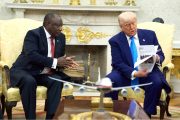In the aftermath of a series of bombings on Christmas Day, Nigerians have reason to worry that Islamic terrorism will continue to increase in their country. Boko Haram, the organization behind much of the escalating anti-Christian violence in that African country, is dedicated to a campaign of fear and murder in a society where Muslims and Christians constitute nearly equal proportions of the population.
As reported previously for The New American, dozens of people were killed and approximately 100 were injured on Christmas Day as bombs planted by Boko Haram were detonated at churches while Christians were at worship. Although the Obama administration chose to describe the slaughter as “senseless violence,” the war which the Islamic group has been waging against Nigeria’s Christians is far from senseless; rather, it has been a campaign of terror aimed at driving non-Muslims out of the northern areas of the nation. As noted in an article for the online edition of Spiegel, Boko Haram has conducted a steadily-escalating war against Nigeria’s government, and the nation’s Christian minority:
Boko Haram, a radical Muslim sect whose name means “Western education is sinful,” claimed responsibility for the suicide bombing. It said the attack aimed to kill Christians and make the government look bad. …
This wasn’t the only such attack carried out by Boko Haram. Indeed, in 2011 alone, the group killed up to 600 people.
Just a few years ago, the sect’s fighters from the northeastern part of the country were still using poisoned darts and machetes to kill and maim police officers. Although they looked like a spent force by mid-2009, they have since reorganized, affiliating themselves with a global terrorist network that includes al-Shabab militias in Somalia, militant groups in Pakistan and al-Qaida in the Islamic Maghreb (AQIM) in North Africa.
In recent months, the organization has adopted the use of suicide bombers to conduct attacks on a police station and then the offices of the United Nations in Nigeria’s capital city of Abuja. The widespread bombings on Christmas Day offered a further indication of the growing ability of the Muslim terrorists to coordinate attacks in multiple cities.
As Boko Haram announced following the Christmas Day bombings, the intention was to “kill Christians and make the government look bad.” According to an article from CNSNews, the Islamic terrorists are now warning Christians to abandon the northern territories of Nigeria:
As a three-day ultimatum by al-Qaeda-affiliated radicals for Nigerian southerners — mostly Christians — to leave the country’s predominantly Muslim north ran out Wednesday, police played down the threat while some politicians differed over how the government should respond.
Boko Haram, which last month carried out deadly attacks on Christians for the second consecutive Christmas, made the threat Sunday after President Goodluck Jonathan declared a state of emergency in parts of four northern states where the extremists have been most active. …
Boko Haram’s threat and deadline included a call for Muslims in the south to relocate to the north.
“We wish to call on our fellow Muslims to come back to the north because we have evidence that they would be attacked,” purported Boko Haram spokesman Abul Qaqa told reporters in a telephone conference, according to a report in Nigeria’s Nation daily.
In short, Islamic terrorists are seeking to use their call for a massive migration of the Christian and Muslim populations of Nigeria as a cover for religious violence which they have perpetrated. In fact, it is plausible that at least some within the organization may be hoping for Christians to retaliate as a means of radicalizing more Muslims to recruit them into the ranks of Boko Haram. And a widespread religious migration within Nigeria would offer an opportunity for militant Muslims to seek to cut the country in two, and fulfill the terrorists’ goal of establishing a sharia state. According to Spiegel, the goal of one of Boko Haram’s founders, Mohammed Yusuf, was the imposition of sharia law, and sharia has already been imposed in 12 Nigerian states since 1999.
Although Nigerian President Goodluck Jonathan (pictured above) has been criticized for his slow response to the Christmas Day attacks, he recently vowed during a visit to the site of the Abuja attack — St. Theresa’s Catholic Church — that the government would “crush the terrorists.” In response to the attacks, President Jonathan declared a state of emergency. “Terrorism is a war against all of us,” he said. “I call on all Nigerians to join hands with government to fight these terrorists.”
According to The Telegraph, an important aspect of the state of emergency is the act of sealing Nigeria’s border with its neighbors — an act which is supposed to stop Islamic militants from easily passing between Nigeria an adjoining states:
“The temporary closure of our borders in the affected areas is only an interim measure designed to address the current security challenges and will be resumed as soon as normalcy is restored,” he [Jonathan] added, in a speech addressing deadly Christmas Day bombings by the Boko Haram sect a week ago.
The decree means parts of Nigeria’s border with Niger, Chad and Cameroon will be sealed until further notice.
He added that his chief of defence staff had been instructed to take other “appropriate” measures, including setting up a special counter-terrorism force.
In the aftermath of the second Christmas in a row in which Muslims carried out murderous attacks on Christian churches, more that rhetoric will be necessary to calm the concerns of the Christian population. Vanguard, a Nigerian publication, reports that the National Youth Wing of the Christian Association of Nigeria (CAN), has warned Boko Haram that they will not tolerate any further attacks on churches:
National President of the Youth Wing of CAN, PATRIOT A.S, DOLLY (JP), who read the communiqué at the end of the meeting, warned that Christian youths in the country were now ready for war and would match violence with violence in reaction to the incessant threat to lives and properties of Christians, especially in Northern Nigeria and the recent Christmas day bombings in Madalla, Jos and Maidugiri.
The Youth CAN observed “that the Christmas day bombings [were] uncalled for, totally unacceptable and a direct attack on Christianity. That the year 2011 bombing was the climax of attacks on the church and that the tolerance of the Christian community is the major contributor to the continued existence of Nigeria.”
They maintained that the current terrorism act falls short of any expectations and was baseless without motive by the faceless group called Boko Haram which has rained terror on defenseless women and children mostly Christians.
The Youth CAN called on “the Federal Government to rise up to expectations. The Security chiefs should be given an ultimatum to decisively deal with the perpetrators and sponsors of the Boko Haram or be shown the way out.”
For now, it would seem that Youth CAN will wait to see whether the Nigerian government will fulfill its responsibility to enforce the nation’s laws, and bring Islamic terrorism to an end. The alternative — a Nigeria in which Christians believe they must take the responsibility of responding to the violence of Boko Haram on their own — could mean a pattern of escalation leading to the division of Nigeria.
Photo: Nigerian President Goodluck Jonathan




